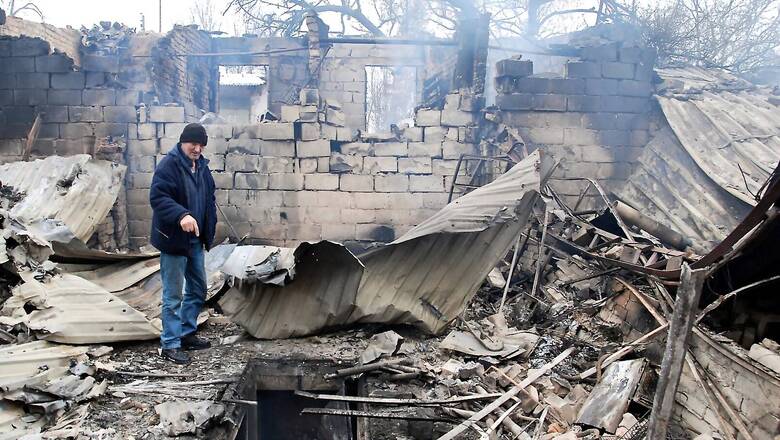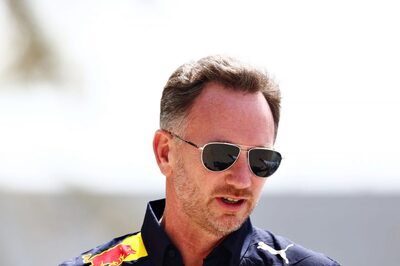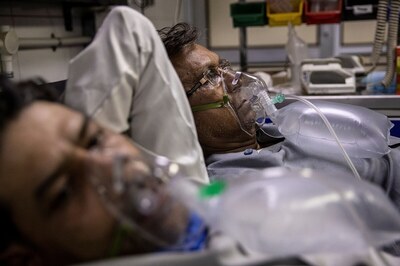
views
The unnecessary war in Ukraine could have been avoided as the basis of an agreement has existed for several years. However, the West’s determination to corner Russia geopolitically and economically and the latter’s security anxieties have inexorably led to it.
Ukraine has not found an internal political balance since its independence 31 years ago. Developing a new national identity, rise of extreme right-wing nationalism, ethnic and linguistic divisions, widespread corruption, internal contradictory pulls toward either joining the EU and NATO or Russia and the Eurasian Economic Union, oil pricing and transportation issues with Russia, all these have been a source of internal and external tensions.
President Volodymyr Zelensky, a TV comedian and producer of films, cartoons and TV shows, who has won dance shows and acted as Paddington and Napoleon, played the role of president in the very popular TV series Servant of the People, aired from 2015 to 2019, succeeded in translating fiction into reality by winning the presidential election in 2019 handsomely in the second round over his rival Petro Poroshenko. His party Servant of the People, named after the TV series, won the legislative elections too soon after he became president.
The irony is that his platform for the virtually conducted election was internal reconciliation and unity with the Russian-speaking population concentrated in the east and the end of the protracted conflict with Russia despite its annexation of Crimea. The latter has been simmering since the Maidan protests which led to the ouster of the legitimately elected president Viktor Yanukovych in what Moscow saw as an effective coup d’état supported by the Americans to draw Ukraine toward the West and away from Russia.
A visible actor in the Maidan drama was Victoria Nuland, then Assistant Secretary of State and now Under Secretary in the State Department whose grandfather was a Ukrainian Jew who migrated to the US in the early ‘20s and whose father is New York-born Shepsel Ber Nudelman. Add to this is the genealogy of Secretary of State Blinken’s whose grandfather was also a Ukrainian Jew who migrated to the US in 1904. Whether and how much all this colours the US policy toward Ukraine is a matter of debate.
That Zelensky has failed to act on his electoral promise of reconciliation with the Russians in its internal and external dimensions is significant. The Minsk Agreements of 2014-2015 brokered by France and Germany and ratified by the UN Security Council provided the basis of a reconciliation but the failure to implement them has led to the present conflict. With the recognition by Russia of the independence of the Luhansk and Donetsk People’s Republics, the Minsk Agreements have now become defunct.
ALSO READ | The Russia-Ukraine War is a Revenge of Geography
Ukraine-NATO Growing Relationship
For Russia, the conflict has now gone much beyond the issue of the status of these two Republics. It has acquired a much larger dimension, that of demilitarisation and denazification of Ukraine. Zelensky, according to the Russians, is a pawn in the hands of the Ukrainian nationalist forces harbouring Russia-hating Nazi extremists. The West disputes this though there is visible evidence of rallies by these extremists. NATO’s presence in Ukraine even without membership is a reality, especially after the 2015 Minsk Agreements.
Since the Warsaw NATO Summit in July 2016, NATO’s Comprehensive Assistance Package (CAP) for Ukraine has been operational. Contrary to the West’s position that Ukraine’s NATO membership is not on the agenda and that the Russians have used this as a false excuse to invade Ukraine, the known facts seem different. The Ukrainians have been upping the ante on their NATO membership, obviously not without external encouragement. In June 2017, the Ukrainian Parliament adopted legislation reinstating membership in NATO as a strategic foreign and security policy objective. In 2019, a corresponding amendment to Ukraine’s Constitution entered into force.
If this was before Zelensky came to power, after he did so, in September 2020, he approved Ukraine’s new National Security Strategy which provides for the development of the partnership with NATO with the aim of eventual membership. Instead of Ukraine’s NATO membership being put on the back burner, the Ukrainians have given it more political and legal visibility. In addition, NATO has increased its presence in the Black Sea and stepped up maritime cooperation with Ukraine as well as Georgia.
According to available information, NATO has been engaged in 16 capacity-building programmes in Ukraine through Trust Funds, including modernising its C4 structures (Command, Control, Communications and Computers) to facilitate interoperability with NATO, reforming Ukraine’s logistics, boosting its cyber defence, supporting eight defence education institutions etc. Following the Russia-Ukraine crisis, air data information provided by NATO has been extended to cover a larger area.
Ukraine has actively participated in NATO’s Operational Capabilities Concept to put together tailored force packages that can be deployed in support of NATO-led operations and missions. In June 2020, Ukraine became the sixth Enhanced Opportunity Partner (EOP), a status offered to participants in NATO’s Partnership Interoperability Initiative. This provides Ukraine preferential access to NATO’s interoperability toolbox, including exercises, training, exchange of information and situational awareness. A NATO-Ukraine platform on countering hybrid warfare was established in July 2016. Ukraine has supported NATO-led operations in Bosnia and Herzegovina, the Kosovo Force (KFOR) and the International Security Assistance Force (ISAF) in Afghanistan.
From March 2005, Ukraine has contributed officers to the NATO Training Mission in Iraq. It deployed ships six times between 2007 and 2010 in support of Operation Active Endeavour, a counter-terrorist maritime surveillance operation in the Mediterranean Sea. In 2013, it also contributed to NATO’s counter-piracy operation Ocean Shield. Since the launch of maritime operation Sea Guardian in 2016, Ukraine continues to provide information in support of NATO’s maritime situational awareness in and around the Black Sea.
Ukraine’s Neutrality a Must
Ukraine has been receiving US and European military support far more visibly after the annexation of Crimea. The US has publicly admitted that after 2014, the US has provided more assistance to deter Russia. In August 2021, an additional $60 million was provided, and $200 million more by December. In February this year another $350 million was made available, bringing the total US military assistance to Ukraine to $1 billion over the past year. The UK has trained 16,000 Ukrainian military personnel by its own admission. The US and NATO allies have provided 17,000 anti-tank weapons and 2,000 Stinger missiles even before the invasion began, with the UK delivering 2,000 light anti-tank missiles.
During the course of the present conflict, the Ukrainians are being armed. Sweden is sending 5,000 anti-tank weapons in addition to $52 million of military aid. Apart from Finland which has supplied anti-tank weapons, the Baltic states have supplied Stingers and Javelin missiles. In a major reversal of policy, which the Germans now claim overcomes its reluctance to supply arms to warring zones, Germany has supplied 1,000 anti-tank weapons and 500 Stinger missiles. Recent weapon deliveries include several thousand assault rifles, machine guns, anti-tank mines, vast quantities of ammunition etc.
All this military support being offered will prolong the fighting, with a view to bogging down the Russian armed forces, as in Afghanistan. It will lead to further destruction of Ukraine’s infrastructure and more civilian casualties. Such flow of arms no doubt encourages Ukrainian nationalists to continue their resistance, even as the West has at the same time made it clear that it will not intervene militarily against the Russian armed forces.
This has not deterred Zelensky to make fervent theatrical appeals to the West to intervene, believing that he can employ smart communication techniques used by him to win the presidential election to rouse public opinion in the West in his favour and persuade the Western governments to directly intervene. Even as talks between the Russian and Ukrainian delegations are taking place in Belarus, with three rounds so far, Zelensky has not ceased his dramatics, calling Putin a terrorist, pressing for sanctions on Russia, signing an application for EU membership and asking for immediate acceptance knowing that it takes years to negotiate it in the best of circumstances, appealing for a no-fly zone over Ukraine despite repeated rejections by the West, afraid to trigger World War-3. He has made a phone call to President Biden asking for jets and energy bans on Russia, virtually appealed to the European Parliament as well as the US Congress, receiving standing ovations.
Treating him as a hero shows a serious loss of West’s ability to discriminate, blinded by their deep-seated aversion and hostility to Putin’s Russia, even if in the process the Ukrainian people will suffer and the world in general too because of the draconian sanctions imposed on Moscow.
The West should be pro-active in finding a route to negotiations and encouraging Zelensky and his entourage to do so too to end the violence and bombing, save human lives and suffering and check the refugee flows. A ceasefire and de-escalation are immediately needed as the first essential step toward the only solution possible, however difficult, one of Ukraine’s neutrality guaranteed by all parties.
Kanwal Sibal is the former Indian Foreign Secretary. He was India’s Ambassador to Turkey, Egypt, France and Russia. The views expressed in this article are those of the author and do not represent the stand of this publication.
Read all the Latest Opinion News and Breaking News here




















Comments
0 comment